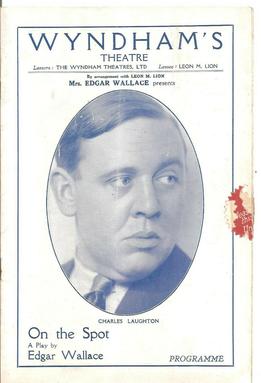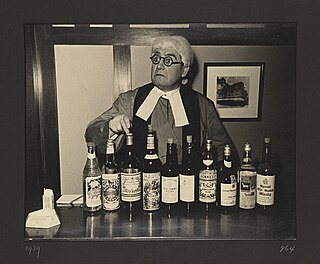Related Research Articles
Laburnum Grove is a comedy-drama play by the British writer J.B. Priestley which was first staged in 1933. It was one of Priestley's earliest hits. The play premiered at the Duchess Theatre on 28 November 1933. In its initial run it had over 300 performances. It made its Broadway debut at Booth's Theatre on 14 January 1935 and ran for 131 performances.
The Man Who Changed His Name is a mystery play by the British writer Edgar Wallace, which was first staged in 1928. A young woman begins to suspect that her wealthy, respectable husband may be an escaped Canadian murderer.

On the Spot is a 1930 Chicago-set play by the British writer Edgar Wallace. Wallace was inspired by a visit to the United States and, in particular, the Saint Valentine's Day Massacre. Known as a prolific author, he reportedly dictated the manuscript for the play in just four days. It was his greatest theatrical success.
The Calendar is a 1929 play by the British writer Edgar Wallace. It is a crime thriller set in the world of horse racing world, the sport being among Wallace's interests. The protagonist is a financially struggling racehorse owner with a shady reputation. It premiered at the Palace Theatre in Manchester before transferring to Wyndham's Theatre in the West End.
The Mouthpiece is a 1930 crime play by the British writer Edgar Wallace. It was one of several theatrical failures written by Wallace following the enormous success of On the Spot, with a plot described as "flimsy".
The Old Man is a 1931 mystery play by the British writer Edgar Wallace. Its original production was staged at Wyndham's Theatre in London's West End for a ninety performance run. It is set entirely in the "Coat of Arms" tavern where a mysterious old man lurks in the background, reputedly an escapee from a lunatic asylum. The original cast included Alfred Drayton, Jack Melford, Harold Warrender and Finlay Currie.
Persons Unknown is a 1929 mystery play by the British writer Edgar Wallace. The plot revolves around the murder of a "person unknown" in a street by a mysterious blackmailer. It features the character of Sergeant Elk, a Scotland Yard detective who appeared in several of Wallace's novels.
M'Lady is a 1921 play by the British writer Edgar Wallace. It is a drama about a woman who tries to raise her daughter in high society, only for her husband to return from Broadmoor where he has been serving a sentence for killing a police officer. It was panned by theatre critics.
The Terror is a 1927 mystery thriller play by the British writer Edgar Wallace. It is based on Wallace's 1926 novel The Black Abbot.
Smoky Cell is a thriller play by the British writer Edgar Wallace first staged in 1930. In America a group of detectives hunt down a notorious racketeer.
Somebody Knows is a 1932 mystery play by the British writer John Van Druten about an entertainer who is accused of strangling a prostitute. Following a court case there is not enough evidence to convict him, leaving the audience unsure of his actual guilt.

The Unguarded Hour is a 1935 play by Bernard Merivale, inspired by a Hungarian work by Ladislas Fodor.

Blondie White is a 1937 mystery play by British writer Jeffrey Dell and Bernard Merivale. A murder mystery, it was inspired by an earlier play by Hungarian writer Ladislas Fodor. A famous crime novelist helps Scotland Yard to solve the murder of a nightclub performer, Blondie White.

A Murder Has Been Arranged is a 1930 thriller play by the British writer Emlyn Williams.

Someone Waiting is a 1953 thriller play by the British writer Emlyn Williams.

The Amazing Dr. Clitterhouse is a 1936 thriller play by the British writer Barré Lyndon. The lead character's name is a play on the term for the female sexual organ the clitoris - a name characterised by the "yearning, untrammelled nature" of Clitterhouse himself; an extremely daring pun for 1936, yet seemingly anticipated by Lyndon to escape the notice of the contemporary censor. Lyndon wrote, "My view was that he was no more likely to locate the pun in my title as to locate the source of it on his beloved bedfellow".

Blackmail is a 1928 thriller play by the British writer Charles Bennett. In Chelsea, an artist's model kills an artist when he attempts to assault her.

Ten Minute Alibi is a 1933 crime thriller play by the British author Anthony Armstrong. It premiered at the Embassy Theatre in Swiss Cottage before transferring to London's West End. It ran for 857 performances between 8 February 1933 and 26 January 1935, initially at the Haymarket Theatre before switching to the Phoenix Theatre. The London cast included Anthony Ireland, Robert Douglas, Bernard Lee, George Merritt, Charles Hickman, Celia Johnson, Jessica Tandy, Gillian Maude and Aileen Marson. It was directed by Sinclair Hill. A Broadway version at the Ethel Barrymore Theatre ran for 89 performances.

Without Witness is a mystery thriller play by the British authors Anthony Armstrong and Harold Simpson. It premiered at the Embassy Theatre in Swiss Cottage on 27 December 1933 before transferring to the Duke of York's Theatre in London's West End where it ran for 75 performances between 12 March and 12 June 1934, having been revised slightly from its Embassy premiere. The West End cast included Nicholas Hannen, Arthur Wontner, Bernard Lee, Frederick Piper, Hugh E. Wright, Joan Marion and Marion Fawcett.

Laughter in Court is a 1936 comedy play by the British writher Hugh Mills. It premiered at the Grand Theatre, Blackpool before transferring to the Shaftesbury Theatre in London's West End where it ran for 117 performances. The West End cast included Yvonne Arnaud, Ronald Squire, Evelyn Roberts, Edmund Breon and Wilfrid Caithness. It was one of a number of plays of the era with courtroom settings.